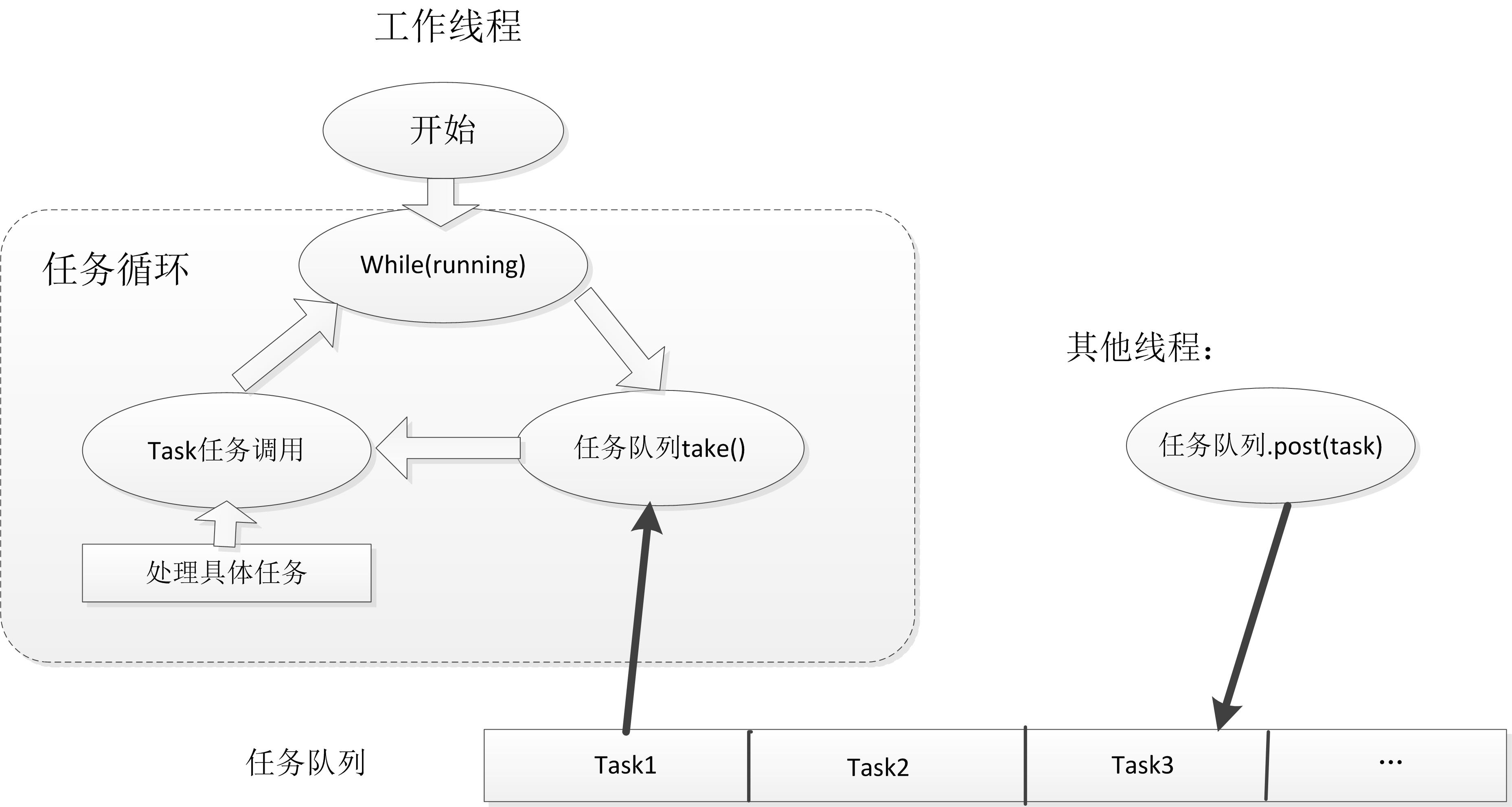为什么要使用线程池?
- 一个医院,每天面对成千上万的病人,处理方式是:来一个病人找来一个医生处理,处理完了医生也走了。当看病时间较短的时间,医生来去的时间,显得尤为耗时。
- 医院引进了线程池的概念。 设置门诊,把医生全派出去坐诊,病人来看病先挂号排队,医生根据病人排队顺序依次处理各个病人,这样就省去医生来去的时间。但是,很多时候病人不多,医生却很多导致很多医生空闲浪费资源。
- 医院引进了可伸缩性线程池的概念, 刚开始,只派出部门医生,但是增加一个领导,病人依旧排队看病,领导负责协调整个医院的医生。当病人很多,医生忙不过来的时候,领导就多叫几个医生来帮忙;当病人不多的时候,领导就叫一些空闲的医生回家休息免得浪费医院资源。
总的来说,线程池包括:n个执行任务的工作线程,一个任务队列,一个管理线程
1. 预先启动一些线程,线程负责执行任务队列中的任务,当队列为空,线程挂起。
2. 调用的时候,直接往任务队列添加任务,并发信号通知线程有任务要执行
3. 管理线程负责监控任务队列和系统中的线程的状态,当任务队列为空,而且线程很多处于空闲状态,便通知一些线程退出以节约资源;当任务队列任务多且线程都在忙,便启动一些线程来执行任务,以确保效率。
下图为线程池的流程图:

处理流程:
- 当任务队列中有任务时,各线程中队列中取任务并执行任务
- 若任务队列中没有任务,各线程阻塞等待
- 若有新任务到达,唤醒一个线程,去处理新来的任务
下图为工作线程的示意图:

处理流程:
在没有任务时阻塞等待,当收到新任务的信号,循环的执行任务
注意,在工作线程(workthread)中,不停的循环取任务执行,这里的任务是与具体任务无关的,只是一个任务接口类,供用户自己实现
网上一个不错的教程
#include <stdlib.h>
#include <pthread.h>
#include <unistd.h>
#include <assert.h>
#include <stdio.h>
#include <string.h>
#include <signal.h>
#include <errno.h>
#include "threadpool.h"
#define DEFAULT_TIME 10 // 领导定时检查队列、线程状态的时间间隔
#define MIN_WAIT_TASK_NUM 10 // 队列中等待的任务数>这个值,便会增加线程
#define DEFAULT_THREAD_VARY 10 //每次线程加减的数目
typedef struct
{
void *(*function)(void *);
void *arg;
} threadpool_task_t;
struct threadpool_t
{
pthread_mutex_t lock;// mutex for the taskpool
pthread_mutex_t thread_counter;//mutex for count the busy thread
pthread_cond_t queue_not_full;
pthread_cond_t queue_not_empty;//任务队列非空的信号
pthread_t *threads;//执行任务的线程
pthread_t adjust_tid;//负责管理线程数目的线程
threadpool_task_t *task_queue;//任务队列
int min_thr_num;
int max_thr_num;
int live_thr_num;
int busy_thr_num;
int wait_exit_thr_num;
int queue_front;
int queue_rear;
int queue_size;
int queue_max_size;
bool shutdown;
};
/**
* @function void *threadpool_thread(void *threadpool)
* @desc the worker thread
* @param threadpool the pool which own the thread
*/
void *threadpool_thread(void *threadpool);
/**
* @function void *adjust_thread(void *threadpool);
* @desc manager thread
* @param threadpool the threadpool
*/
void *adjust_thread(void *threadpool);
/**
* check a thread is alive
*/
bool is_thread_alive(pthread_t tid);
int threadpool_free(threadpool_t *pool);
//创建线程池
threadpool_t *threadpool_create(int min_thr_num, int max_thr_num, int queue_max_size)
{
threadpool_t *pool = NULL;
do{
if((pool = (threadpool_t *)malloc(sizeof(threadpool_t))) == NULL)
{
printf("malloc threadpool fail");
break;
}
pool->min_thr_num = min_thr_num;
pool->max_thr_num = max_thr_num;
pool->busy_thr_num = 0;
pool->live_thr_num = min_thr_num;
pool->queue_size = 0;
pool->queue_max_size = queue_max_size;
pool->queue_front = 0;
pool->queue_rear = 0;
pool->shutdown = false;
pool->threads = (pthread_t *)malloc(sizeof(pthread_t)*max_thr_num);
if (pool->threads == NULL)
{
printf("malloc threads fail");
break;
}
memset(pool->threads, 0, sizeof(pool->threads));
pool->task_queue = (threadpool_task_t *)malloc(sizeof(threadpool_task_t)*queue_max_size);
if (pool->task_queue == NULL)
{
printf("malloc task_queue fail");
break;
}
if (pthread_mutex_init(&(pool->lock), NULL) != 0
|| pthread_mutex_init(&(pool->thread_counter), NULL) != 0
|| pthread_cond_init(&(pool->queue_not_empty), NULL) != 0
|| pthread_cond_init(&(pool->queue_not_full), NULL) != 0)
{
printf("init the lock or cond fail");
break;
}
/**
* start work thread min_thr_num
*/
for (int i = 0; i < min_thr_num; i++)
{
//启动任务线程
pthread_create(&(pool->threads[i]), NULL, threadpool_thread, (void *)pool);
printf("start thread 0x%x...\n", pool->threads[i]);
}
//启动管理线程
pthread_create(&(pool->adjust_tid), NULL, adjust_thread, (void *)pool);
return pool;
}while(0);
threadpool_free(pool);
return NULL;
}
//把任务添加到队列中
int threadpool_add(threadpool_t *pool, void*(*function)(void *arg), void *arg)
{
assert(pool != NULL);
assert(function != NULL);
assert(arg != NULL);
pthread_mutex_lock(&(pool->lock));
//队列满的时候,等待
while ((pool->queue_size == pool->queue_max_size) && (!pool->shutdown))
{
//queue full wait
pthread_cond_wait(&(pool->queue_not_full), &(pool->lock));
}
if (pool->shutdown)
{
pthread_mutex_unlock(&(pool->lock));
}
//如下是添加任务到队列,使用循环队列
if (pool->task_queue[pool->queue_rear].arg != NULL)
{
free(pool->task_queue[pool->queue_rear].arg);
pool->task_queue[pool->queue_rear].arg = NULL;
}
pool->task_queue[pool->queue_rear].function = function;
pool->task_queue[pool->queue_rear].arg = arg;
pool->queue_rear = (pool->queue_rear + 1)%pool->queue_max_size;
pool->queue_size++;
//每次加完任务,发个信号给线程
//若没有线程处于等待状态,此句则无效,但不影响
pthread_cond_signal(&(pool->queue_not_empty));
pthread_mutex_unlock(&(pool->lock));
return 0;
}
//线程执行任务
void *threadpool_thread(void *threadpool)
{
threadpool_t *pool = (threadpool_t *)threadpool;
threadpool_task_t task;
while(true)
{
/* Lock must be taken to wait on conditional variable */
pthread_mutex_lock(&(pool->lock));
//任务队列为空的时候,等待
while ((pool->queue_size == 0) && (!pool->shutdown))
{
printf("thread 0x%x is waiting\n", pthread_self());
pthread_cond_wait(&(pool->queue_not_empty), &(pool->lock));
//被唤醒后,判断是否是要退出的线程
if (pool->wait_exit_thr_num > 0)
{
pool->wait_exit_thr_num--;
if (pool->live_thr_num > pool->min_thr_num)
{
printf("thread 0x%x is exiting\n", pthread_self());
pool->live_thr_num--;
pthread_mutex_unlock(&(pool->lock));
pthread_exit(NULL);
}
}
}
if (pool->shutdown)
{
pthread_mutex_unlock(&(pool->lock));
printf("thread 0x%x is exiting\n", pthread_self());
pthread_exit(NULL);
}
//get a task from queue
task.function = pool->task_queue[pool->queue_front].function;
task.arg = pool->task_queue[pool->queue_front].arg;
pool->queue_front = (pool->queue_front + 1)%pool->queue_max_size;
pool->queue_size--;
//now queue must be not full
pthread_cond_broadcast(&(pool->queue_not_full));
pthread_mutex_unlock(&(pool->lock));
// Get to work
printf("thread 0x%x start working\n", pthread_self());
pthread_mutex_lock(&(pool->thread_counter));
pool->busy_thr_num++;
pthread_mutex_unlock(&(pool->thread_counter));
(*(task.function))(task.arg);
// task run over
printf("thread 0x%x end working\n", pthread_self());
pthread_mutex_lock(&(pool->thread_counter));
pool->busy_thr_num--;
pthread_mutex_unlock(&(pool->thread_counter));
}
pthread_exit(NULL);
return (NULL);
}
//管理线程
void *adjust_thread(void *threadpool)
{
threadpool_t *pool = (threadpool_t *)threadpool;
while (!pool->shutdown)
{
sleep(DEFAULT_TIME);
pthread_mutex_lock(&(pool->lock));
int queue_size = pool->queue_size;
int live_thr_num = pool->live_thr_num;
pthread_mutex_unlock(&(pool->lock));
pthread_mutex_lock(&(pool->thread_counter));
int busy_thr_num = pool->busy_thr_num;
pthread_mutex_unlock(&(pool->thread_counter));
//任务多线程少,增加线程
if (queue_size >= MIN_WAIT_TASK_NUM
&& live_thr_num < pool->max_thr_num)
{
//need add thread
pthread_mutex_lock(&(pool->lock));
int add = 0;
for (int i = 0; i < pool->max_thr_num && add < DEFAULT_THREAD_VARY
&& pool->live_thr_num < pool->max_thr_num; i++)
{
if (pool->threads[i] == 0 || !is_thread_alive(pool->threads[i]))
{
pthread_create(&(pool->threads[i]), NULL, threadpool_thread, (void *)pool);
add++;
pool->live_thr_num++;
}
}
pthread_mutex_unlock(&(pool->lock));
}
//任务少线程多,减少线程
if ((busy_thr_num * 2) < live_thr_num
&& live_thr_num > pool->min_thr_num)
{
//need del thread
pthread_mutex_lock(&(pool->lock));
pool->wait_exit_thr_num = DEFAULT_THREAD_VARY;
pthread_mutex_unlock(&(pool->lock));
//wake up thread to exit
for (int i = 0; i < DEFAULT_THREAD_VARY; i++)
{
pthread_cond_signal(&(pool->queue_not_empty));
}
}
}
}
int threadpool_destroy(threadpool_t *pool)
{
if (pool == NULL)
{
return -1;
}
pool->shutdown = true;
//adjust_tid exit first
pthread_join(pool->adjust_tid, NULL);
// wake up the waiting thread
pthread_cond_broadcast(&(pool->queue_not_empty));
for (int i = 0; i < pool->min_thr_num; i++)
{
pthread_join(pool->threads[i], NULL);
}
threadpool_free(pool);
return 0;
}
int threadpool_free(threadpool_t *pool)
{
if (pool == NULL)
{
return -1;
}
if (pool->task_queue)
{
free(pool->task_queue);
}
if (pool->threads)
{
free(pool->threads);
pthread_mutex_lock(&(pool->lock));
pthread_mutex_destroy(&(pool->lock));
pthread_mutex_lock(&(pool->thread_counter));
pthread_mutex_destroy(&(pool->thread_counter));
pthread_cond_destroy(&(pool->queue_not_empty));
pthread_cond_destroy(&(pool->queue_not_full));
}
free(pool);
pool = NULL;
return 0;
}
int threadpool_all_threadnum(threadpool_t *pool)
{
int all_threadnum = -1;
pthread_mutex_lock(&(pool->lock));
all_threadnum = pool->live_thr_num;
pthread_mutex_unlock(&(pool->lock));
return all_threadnum;
}
int threadpool_busy_threadnum(threadpool_t *pool)
{
int busy_threadnum = -1;
pthread_mutex_lock(&(pool->thread_counter));
busy_threadnum = pool->busy_thr_num;
pthread_mutex_unlock(&(pool->thread_counter));
return busy_threadnum;
}
bool is_thread_alive(pthread_t tid)
{
int kill_rc = pthread_kill(tid, 0);
if (kill_rc == ESRCH)
{
return false;
}
return true;
}
// for test
//void *process(void *arg)
//{
//printf("thread 0x%x working on task %d\n ",pthread_self(),*(int *)arg);
//sleep(1);
//printf("task %d is end\n",*(int *)arg);
//return NULL;
//}
//int main()
//{
//threadpool_t *thp = threadpool_create(3,100,12);
//printf("pool inited");
//
//int *num = (int *)malloc(sizeof(int)*20);
//for (int i=0;i<10;i++)
//{
//num[i]=i;
//printf("add task %d\n",i);
//threadpool_add(thp,process,(void*)&num[i]);
//}
//sleep(10);
//threadpool_destroy(thp);
//}
